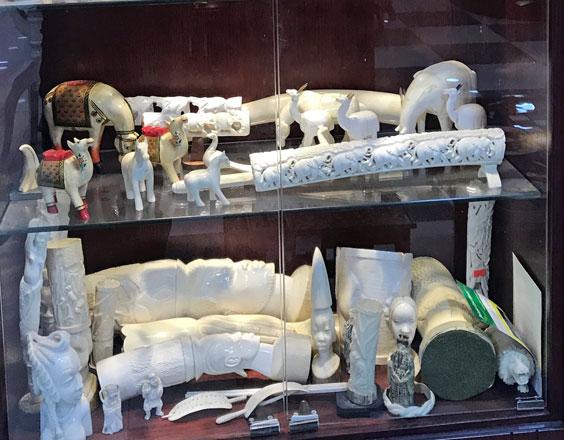You are here
23 smuggled ivory ornaments confiscated at South Amman rest station
By Hana Namrouqa - Apr 11,2018 - Last updated at Apr 11,2018

The ivory ornaments are seen on display at a rest station in south Amman on Wednesday (Photo courtesy of the RSCN)
AMMAN — Authorities on Wednesday made the fourth confiscation of ivory since the start of the year, seizing 23 ivory ornaments displayed for sale in a rest station south the capital.
A joint patrol from the Rangers and the Royal Society for the Conservation of Nature (RSCN) seized and confiscated the ivory ornaments, which were on display for sale at a rest station, according to head of the law enforcement section at the RSCN, Abdul Razzaq Hmoud.
“Initial investigation revealed that the ivory products were smuggled into the country over different periods of time and from different sources. Experts inspected the items and proved that they were carved out of elephant tusks,” Hmoud told The Jordan Times.
The trade in elephant tusks or objects made of ivory is illegal as elephants are globally endangered and listed under the Convention on International Trade in Endangered Species of Wild Fauna and Flora (CITES).
“The value of the confiscated ivory products is very high, estimated at tens of thousands of Jordanian dinars. They are now in the possession of the RSCN,“ Hmoud noted.
Because ivory trade is illegal, tusks and ivory ornaments are usually sold for hefty amounts of money in the black market with 1 kilogramme of raw or un-worked ivory being sold for $3,000 to $8,000 in the black market, according to the RSCN.
Authorities have fined the owner of the rest station where the items were discovered during an inspection patrol, Hmoud highlighted.
On Monday, the Rangers and the RSCN seized and confiscated three elephant tusks smuggled into Jordan for trade purposes. Earlier this year, several other tusks had already been confiscated.
No confiscations of elephant tusks had happened in at least the past five years in Jordan. “I believe that there are several factors that gave rise to the recent confiscations of ivory in Jordan, including the fact that the Kingdom became a transit point for smuggling such items given the regional instability that weakens law enforcement in neighbouring countries witnessing turmoil,” Hmoud said.
He also cited the campaign to raise awareness of customs department’s employees and Rangers on the CITES through training workshops as another factor that contributed to the rise ivory confiscations.
Hmoud said that the society always notifies the CITES secretariat in Geneva with such confiscations, noting that, in such cases, a representative of the secretariat usually oversees the destruction process of the ivory tusks to prevent any illegal trade. Elephant tusks and ivory objects remain in the possession of the RSCN and are not sent back to their country of origin in order to prevent illegal trade, the society said.
In 1978, Jordan became a signatory to the CITES, a global agreement between governments aiming to ensure that the international trade in wild animals and plants does not threaten their survival, according to the convention’s website.
Meanwhile, the 2002 Agriculture Law prohibits trade in wild animals unless a permit is issued allowing the export or import of the animal through the Kingdom, according to the RSCN.
Related Articles
AMMAN — Authorities on Monday seized and confiscated three elephant tusks smuggled into Jordan for trade purposes, according to a conservati
AMMAN — The elephant tusks seized and confiscated during a police raid late last week will be destroyed to prevent illicit ivory trade, a co
AMMAN — Authorities recorded 500 cases involving poaching and the illegal possession and trade of wild animals from January to early Decembe

















